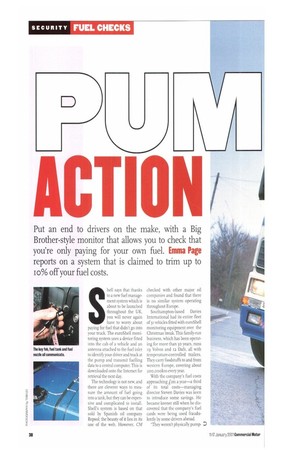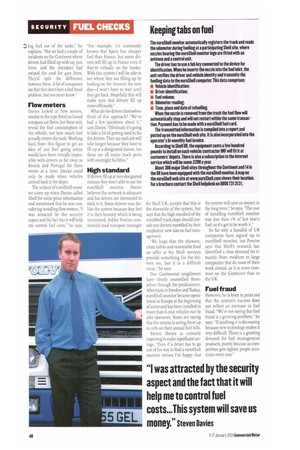ACT ON
Page 40

Page 42

If you've noticed an error in this article please click here to report it so we can fix it.
Put an end to drivers on the make, with a Big Brother-style monitor that allows you to check that you're only paying for your own fuel. Emma Page reports on a system that is claimed to trim up to To% off your fuel costs.
Shell says that thanks to a new fuel management system which is about to be launched throughout the UK, you will never again have to worry about paying for fuel that didn't go into your truck. The euro Shell monitoring system uses a device fitted into the cab of a vehicle and an antenna attached to the fuel inlet to identify your driver and truck at the pump and transmit fuelling data to a central computer. This is downloaded onto the Internet for retrieval the next day.
The technology is not new, and there are cleverer ways to measure the amount of fuel going into a tank, but they can be expensive and complicated to install. Shell's system is based on that sold by Spanish oil company Repsol; the beauty of it lies in its use of the web. However, CM
checked with other major oil companies and found that there is no similar system operating throughout Europe.
Southampton-based Davies International had its entire fleet of 31 vehicles fitted with euroShell monitoring equipment over the Christmas break. This family-run business, which has been operating For more than 30 years, runs 19 Volvos and 12 Dafs, all with temperature-controlled trailers. They carry foodstuffs to and from western Europe, covering about zoo,000km every year.
With the company's fuel costs approaching f im a year—a third of its total costs—managing director Steven Davies was keen to introduce some savings. He became keener still when he discovered that the company's fuel cards were being used fraudulently by some drivers abroad.
"They weren't physically pump ing fuel out of the tanks," he explains. "But we had a couple of incidents on the Continent where drivers had filled up with say 300 litres, and the attendant had swiped the card for 400 litres. They'd split the difference between them. A lot of companies say that they don't have a fuel fraud problem, but you never know."
Flow meters
Davies looked at flow meters, similar to the type fitted on leased company car fleets, but these only reveal the fuel consumption of the vehicle, not how much fuel actually enters the tank. Working back from this figure to get an idea of any fuel going astray would have been virtually impossible with drivers as far away as Bosnia and Portugal for three weeks at a time; checks could only be made when vehicles arrived back at the depot.
The subject of euroShell monitor came up when Davies called Shell for some price information and mentioned that he was considering installing flow meters. "I was attracted by the security aspect and the fact that it will help me control fuel costs," he says.
"For example, it's commonly known that Spain has cheaper fuel than France, but some drivers will fill up in France even if they're virtually on the border. With this system I will be able to see where they are filling up by looking on the Internet the next day—I won't have to wait until they get back. Hopefully this will make sure that drivers fill up more efficiently."
What do the drivers themselves think of this approach? "We've had a few questions about it," says Davies. "Obviously it's going to take a bit of getting used to for the drivers. They say each job will take longer because they have to fill up at a designated station, but these are all major truck pork with overnight facilities."
High standard
If drivers fill up at non-designated stations they won't able to use the euroShell monitor. Davies believes the network is adequate and his drivers are instructed to stick to it. Some drivers may dislike the system because they feel it is their honesty which is being scrutinised. Ashley Proctor, commercial road transport manager
for Shell UK, accepts that this is the downside of the system, but says that the high standard of the euroShell truck stops should console any drivers mortified by their employers' new take on fuel management.
"We hope that the showers, clean toilets and reasonable food on offer at the Shell services provide something for the drivers too, but it is a difficult issue." he says.
Our Continental neighbours have clearly counselled themselves through the predicament. After trials in Sweden and Turkey, euroShell monitor became operational in Europe at the beginning of 2000 and has been installed in more than 6,000 vehicles run by 260 operators. Some are saying that the system is saving them up to ro% on their annual fuel bills.
Steven Davies is certainly expecting to make significant savings. "Even if a driver has to go out of his way to find a euroShell monitor station I'm happy that the system will save us money in the long term," he says. "The cost of installing euroShell monitor was less than t% of last year's fuel, so it's got to be worth it,"
So far only a handful of UK companies have signed up to euro Shell monitor, but Proctor says that Shell's research has identified a clear demand for it: mainly from medium to large companies that do most of their work abroad, as it is more common on the Continent than in the UK.
Fuel fraud
However, he is keen to point out that the system's success does not reflect an increase in fuel fraud. "We're not saying that fuel fraud is a growing problem," he says. 'If anything it is decreasing because new technology makes it very difficult. There is a growing demand for fuel management products, purely because as competition gets tighter, people scrutinise every cost."
































































































